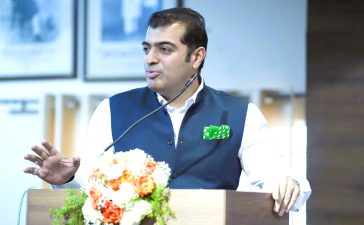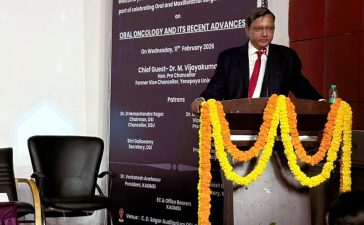Imperial College London Launches Major Science and Innovation Hub in Bengaluru
New initiative aims to deepen UK-India ties in science, technology, and innovation with transformative research collaborations and student opportunities
Bengaluru, India — Imperial College London, one of the world’s leading institutions in science, engineering, and technology, has launched a new global science hub in Bengaluru to co-create cutting-edge research and innovation with Indian partners.
The newly established Imperial Global India aims to serve as a catalyst for UK-India collaboration in critical scientific domains such as climate change, clean energy, artificial intelligence, biotechnology, food and water security, and antimicrobial resistance.
“Our new science hub will forge and strengthen links between Imperial and partners in India,” said Professor Hugh Brady, President of Imperial College London. “These initiatives will help deliver solutions to the world’s biggest challenges.”
A Platform for Scientific Co-Creation
The Bengaluru hub, structured as a liaison office*, will support a wide range of joint initiatives, including:
-
India Connect Fund: Funding up to 25 joint research projects annually in fields like AI, quantum science, clean energy, and biotechnology.
-
Future Leaders Scholarship: Imperial’s largest-ever scholarship initiative for Indian STEMB (science, technology, engineering, mathematics, and business) students, supporting 75 scholars over five years.
-
AI in Science Fellowships: A new partnership with the National Centre for Biological Sciences (NCBS) and Indian Institute of Science (IISc) to create six Eric and Wendy Schmidt AI in Science Faculty Fellowships, establishing a London–Bengaluru AI in Science Network.
-
Global Challenge Lab: A collaborative programme that will bring together hundreds of students from the UK and India to co-develop solutions for the UN Sustainable Development Goals.
-
Joint Doctoral Training: A collaborative PhD programme with IISc, integrating UK and Indian researchers, and supported by a Global Fellows programme for doctoral exchanges between top laboratories in both countries.
Bengaluru: A Strategic Choice
The hub was launched at an event hosted at the Science Gallery Bengaluru, attended by prominent Indian business leaders, policymakers, and scientists. Speakers included Infosys founder N.R. Narayana Murthy, Biocon Group chairperson Kiran Mazumdar-Shaw, Agnikul Cosmos CEO Srinath Ravichandran, and Karnataka state ministers Priyank Kharge and Dr M.C. Sudhakar.
“I am proud that Bengaluru has emerged as a thriving hub of innovation,” said Mr Priyank Kharge, Karnataka’s Minister for Electronics, IT and Biotechnology. “Imperial College London’s presence will further catalyse breakthrough technologies that enhance our environment and quality of life.”
Dr M.C. Sudhakar, Minister for Higher Education, called the partnership a “vital knowledge bridge,” saying it will “empower our students, educators, and innovators to advance science and technology on a global stage.”
Leading the Hub
Imperial Global India will be led by Earth scientist Professor Sanjeev Gupta and biomaterials researcher Dr Elena Dieckmann.
“The hub will connect leading researchers, students, and industry pioneers from India and the UK to rapidly develop and scale groundbreaking ideas into real-world applications,” said Dr Dieckmann.
Imperial’s strategic focus, outlined in its Science for Humanity plan, is to establish a global network of hubs in key cities. The Bengaluru hub joins similar centres in Singapore, San Francisco, and Accra, Ghana.
Building on Strong Foundations
Imperial has long-standing partnerships with Indian institutions. It collaborates with more than 400 Indian organizations, including IISc Bangalore, Christian Medical College Vellore, AIIMS, IIT Bombay, and IIT Delhi. The university also partners with Tata Steel through a joint centre focused on decarbonising steel production.
Imperial currently ranks second globally and first in the UK in the QS World University Rankings.
The new hub aligns with shared UK-India goals to strengthen scientific ties that fuel innovation, economic growth, and job creation.
“Education lies at the heart of the UK’s relationship with India,” said David Lammy MP, UK Secretary of State for Foreign, Commonwealth and Development Affairs. “This new hub will make critical contributions to shared ambitions in health, climate, telecoms, AI, and more.”
UK Science Minister Lord Vallance added, “Science is international by definition. Imperial’s presence in Bengaluru will unlock investment, drive growth, and deliver breakthroughs in energy, health, and beyond.”
*Pending regulatory approvals, the liaison office will initially be managed by a service provider appointed by Imperial College London.
With Imperial Global India now operational, both countries stand to benefit from a dynamic new chapter in collaborative science and innovation—harnessing talent, funding, and vision to confront global challenges head-on.
🔹 Quotes
“This hub is not just about research—it’s about shared solutions to global challenges.”
— Professor Hugh Brady, President, Imperial College London
“Bengaluru’s innovation ecosystem makes it the perfect home for Imperial’s India hub.”
— Priyank Kharge, Minister for Electronics, IT & Biotechnology, Karnataka
“Imperial Global India will turn world-changing ideas into real-world impact.”
— Dr Elena Dieckmann, Co-Director, Imperial Global India
“This partnership empowers our young scientists to think globally and act locally.”
— Dr M.C. Sudhakar, Minister for Higher Education, Karnataka
🔹 Q&A Snippets
Q: Why Bengaluru for Imperial’s science hub?
A: Bengaluru is India’s tech capital with a thriving innovation ecosystem, making it a natural partner for Imperial’s global ambitions.
Q: What kind of projects will the hub support?
A: From AI to biotech, climate tech to clean energy, the hub will fund joint research and innovation with Indian partners.
Q: Who will benefit from the Future Leaders Scholarship?
A: 75 Indian STEMB students will receive funding and mentorship to study at Imperial over the next five years.
Q: How does this fit into UK-India relations?
A: It strengthens educational, scientific, and economic ties—contributing to both nations’ shared development goals.
![]()











